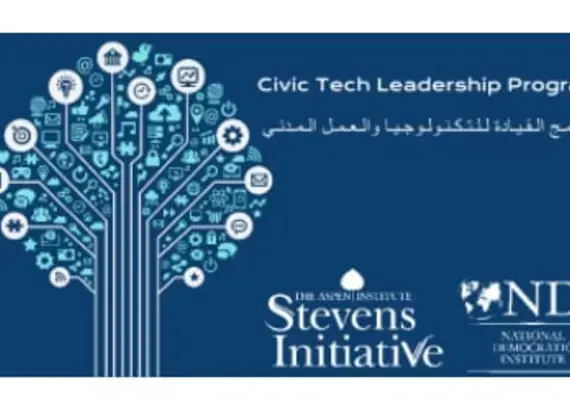
Success Story
Aspen Institute Stevens Initiative Grant: NDI will Expand Virtual Exchange Between Youth in MENA & U.S.
For many young people today, being civic minded and interested in addressing social problems doesn’t translate into traditional political engagement. In the U.S., the “best and brightest” are often drawn more to Silicon Valley than Washington, DC, seeking to solve social problems by means other than government—through volunteerism, the private sector or social enterprises. In the Middle East and North Africa, many young people find too few opportunities to engage the formal political system and, in many places, see closing civic space. But where there are challenges, there are also opportunities—as a new generation of digital natives is finding that social media, games and mobile apps can be applied to improving civic life and addressing social and political problems.
NDI is committed to supporting leaders in this unfolding “civic technology” movement, as well as finding new ways to engage youth. The Aspen Institute’s Stevens Initiative has awarded NDI, together with partners at Stanford University and the Institute for Representative Government, a one-year grant to conduct virtual and in-person exchanges with the aim of increasing cross-cultural understanding and equipping young people in the United States and in the Middle East with 21st century skills. The Stevens Initiative is a public-private partnership designed to increase people-to-people exchange between youth in the United States and the Middle East and North Africa as a lasting tribute to the legacy of Ambassador Chris Stevens, who was killed in Benghazi, Libya in 2012.
Under the Stevens Initiative, NDI’s Civic Tech Leadership Program will offer online instruction and the opportunity to collaborate on projects in a bilingual, bicultural learning environment. In summer 2016, NDI and Stanford University will launch a dual-language version, in English and Arabic, of their free online course Technology for Accountability Lab. From this course, NDI will select approximately 200 applicants for a special mentorship track in which teams of participants will collaborate on bilingual videos about prospective ‘civic tech’ projects. The teams responsible for the top video submissions will be selected for a study trip to Washington, D.C., and Silicon Valley to connect with technologists, policymakers, elected officials, and civic innovators.
Other examples of the work to be undertaken include:
- Online English, Arabic, and Kurdish language exchange between students in California and their peers in Morocco, Iraq and Saudi Arabia;
- Storytelling through virtual reality for middle and high school students in Kentucky, New York, and Jordan, including Syrian refugees;
- A collaborative anthropological project between high school students in Morocco and Chicago;
- Global leadership activities for students in Iraq, Illinois, North Carolina, Oklahoma, Washington, and Wisconsin.
- An online program exploring how the media portrays people in the United Arab Emirates and various states across the United States.
“Civic technology has the potential to transform the relationship between citizens and their governments in positive ways. Equipping the next generation of women and men leaders with the technical skills to improve the lives of their communities is a key element of NDI’s mission,” said NDI President Kenneth Wollack. “The cross-cultural format of this initiative contributes to greater understanding and collaboration across cultural lines -- something that is critically important in our increasingly interconnected world. It also provides an opportunity to honor the legacy of Ambassador Stevens.”
Stanford University is partnering with NDI on the development and implementation of the dual-language course and mentorship track, and it will also host study trip participants. The Institute for Representative Government will engage its network of former Members of Congress to share their perspectives on effective and innovative policymaking through the virtual and in-person exchanges.
“There is a universal aspiration for democracy, human rights, and good governance, and we have abundant public opinion survey evidence to demonstrate that this aspiration is not culturally limited,” said Larry Diamond, senior fellow at the Freeman Spogli Institute for International Studies and former director of the Center for Democracy, Development and the Rule of Law at Stanford University. “I have long believed that technology has the potential to be a game-changing tool in helping people realize these aspirations. This initiative will provide an opportunity to share models for using technology to advance accountability with a young generation of civic technologists in the U.S. and in the Middle East and North Africa.”
Institute for Representative Government Executive Director Peter Weichlein added, “Our board of directors consists of a bipartisan group of former Members of Congress, who regularly engage with youth leaders through programs like the ‘Congress to Campus’ program of the U.S. Association of Former Members of Congress. We are thrilled to be part of an initiative that provides young people with additional skills for democratic participation, whether it leads to a career in public service and politics or to simply being a more active citizen.”
The Initiative provided $5 million to support online programs that will bring more than 20,000 young people together to engage in cross-cultural learning experiences. The programs reach 17 countries in the Middle East and North Africa and 25 American states.
Housed at the Aspen Institute, the Stevens Institute is a collaboration between the family of Ambassador J. Christopher Stevens, the U.S. Department of State, the Bezos Family Foundation, the MacArthur Foundation, the governments of the United Arab Emirates, Qatar, Algeria, and Morocco, and Microsoft, Twitter, Mozilla, and GoPro. Visit www.stevensinitiative.org for more information.



